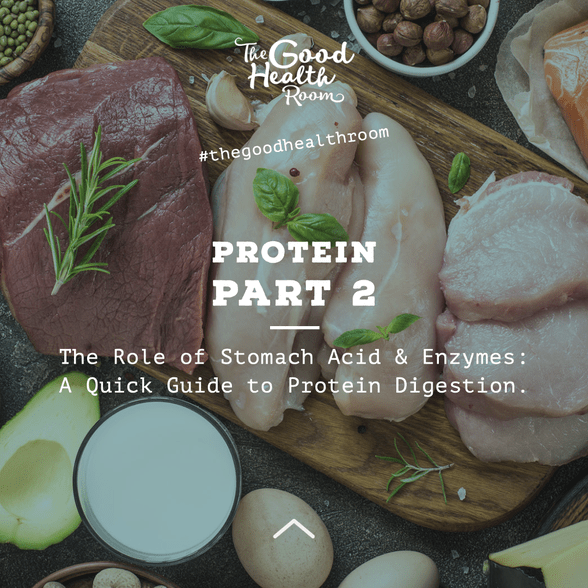8 Key Points to Take Home:
- Protein Digestion Journey 101 – HCl acid in the stomach breaks down protein foods using enzymes (quick video summary).
- Stomach acid (Hydrochloric acid (HCl)) protects us from various microbials found in our food and drink.
- SIBO (Small Intestinal Bacterial Overgrowth) can occur if we have low stomach acid (check out our SIBO blog here).
- Indicators of low stomach acid can be: Nausea, bad breath, rosacea, fatigue, anaemia, bloating, cramping and burping, acid reflux, GERD, and other health issues.
- Causes of low stomach acid can be: Stress, vitamin and mineral deficiencies, stomach surgery, age, some medications inhibiting production.
- We need an HCl acid level of 1-2 in our stomach for correct protein digestion.
- As we age or develop nutritional deficiencies our HCl acid level gets higher and can become compromised, hindering our protein digestion.
- Enzymes make proteins and they are proteins, and are majorly required to 'chop up' protein for digestion in the stomach.
READ THE FULL ARTICLE BELOW | ||
|---|---|---|
AUTHOR: Shona Mackenzie |
Protein Digestion Journey 101
Digesting protein is very complex and many enzymes are required for the job.
- When we chew food, digestion begins. The food becomes a liquid that moves down the oesophagus into the stomach.
- Hydrochloric acid (HCl)* is added to the food ‘liquid’ in the stomach.
- The stomach HCl acid sterilises the food and activates an enzyme (Pepsin) to help ‘chop up’ the protein fibre structure (amino acid chain) – this is Digestion Phase #1.
- HCl acid also activates ‘Intrinsic Factor’ to help absorb B12 from the protein.
- The partially digested protein enters the small intestine where Digestion Phase #2 begins.
- HCl has earlier (during Digestion Phase #1) stimulated bile flow from the liver and pancreatic enzymes into the small intestine to continue this digestion process.
- The small intestine’s fragile membrane wall absorbs digested proteins into the blood stream to be carried to cells for the body to use.
Quick Video Summary
What Is Stomach Acid, Why Do We Need It?
Stomach acid (hydrochloric acid – HCl) majorly protects our body from various bacteria, parasites, and some fungi that come through contaminants in our food and drink. It literally can boil these foreign organisms in acid.
If we have low stomach acid, we can be at risk for these organism to survive in the stomach and pass further into the small intestine, where they can then take up residence. This is called SIBO (Small Intestinal Bacterial Overgrowth).
LOW STOMACH ACID SYMPTOMS |
|---|
- Burping
- GERD or acid reflux
- Bloating and cramping
- Nausea
- Bad breath
- Undigested food seen in stools
- Dislike of animal proteins (due to inability to digest correctly)
- Anaemia (due to inability to digest protein)
- Weak fingernails
- Slow hair growth
- Rosacea (red face, nose, cheek rash)
- Fatigue (a lack of HCl causing poor mineral absorption)
- Depression
| LOW STOMACH ACID CAUSES |
|---|
- Stress
- Age (40+)
- Vitamin & mineral deficiencies – Zinc, B Vitamins
- Surgery to stomach
- Some medications inhibit production of HCl
NOTE: Acidity and alkalinity are measured by using the pH scale which goes from 1-14. The lower the number the greater the acid.
A pH of 7+ can compromise digestion and impair mineral (zinc, selenium, iron, iodine) and magnesium absorption. A pH stomach acidity of 4-5 can trigger the valve ‘door’ between the stomach and oesophagus to not close, causing burning in the throat, heartburn and pain. However, heartburn can also be linked to lower stomach acid, which can be corrected.
Are You Absorbing Enough Amino Acids?
The list below are possible causes that can damage the small intestine's fragile wall lining causing problems with protein absorption during Digestion Phase #2.
PROTEIN MALDIGESTION & MALABSORPTION CAUSES | ||
|---|---|---|
Food Sensitivities and/or intolerances (Book a Hair Analysis)
Prescription medication
Foods contaminated by chemicals and herbicides
SIBO (Small Intestinal Bowel Overgrowth) (Read our blog)
Toxic large bowel bacteria
Yeast (Candida and other fungi)
Enzymes – So Important!
Enzymes MAKE proteins and they ARE proteins that activate chemical reactions in a cell, and they are majorly required for digestion.
| A BASIC GUIDE TO HOW THEY WORK WITH AMINO ACIDS: | ||
|---|---|---|
- Amino acids float all around inside a cell.
- Enzymes are the 'magnetic docking station' for each amino acid to lock into for the correct order, so a protein chain is made.
Other enzymes take amino acid chains apart (as seen with Pepsin in the stomach acid).
Increasing digestive enzymes
Through specific herbs we can support digestive enzyme production as they stimulate ‘gastrin’ release – a gastrointestinal hormone. Gastrin enables better liver and bile flow, and stomach, pancreatic and intestinal juice production. Milk Thistle, Gentian, Andrographis, Dandelion root, Globe Artichoke, Olive Leaf, and Yarrow are all bitter herbs.
As medical herbalist’s at The Good Health Room we are able to make you a custom-made bitters herbal formula to take daily at meal times. The beauty of plant formulas are many have other actions to support overall health. For example, Milk Thistle, Andrographis and Dandelion are excellent liver herbs and promote detoxing and better function.
| FOLLOW US TO KEEP LEARNING |
|---|
| REFERENCES | ||
|---|---|---|
Search for the Perfect Protein: The Key to Solving Weight Loss, Depression, Fatigue, Insomnia and Osteoporosis. (, Dr David Minkoff
https://www.healthline.com/health/why-are-enzymes-important
https://www.hsph.harvard.edu/nutritionsource/collagen/
Washington University in St. Louis. (2017). Popular Heartburn Drug Linked To Higher Early Death Risk. Science News. Retrieved from
https://www.sciencedaily.com/r...
Kuin, C., den Ouden, F., Brandts, H., Deden, L., Hazebroek, E., van Borren, M., & de Boer, H. (2019). Treatment of Severe Protein Malnutrition After Bariatric Surgery. Springer, Obesity Surgery, July; 29:3095-3102. Retrieved from
https://link.springer.com/article/10.1007/s11695-019-04035-8
Kines, K., & Krupczak, T. (2016). Nutritional Interventions for Gastroesophageal Reflux, Irritable Bowel Syndrme, and Hypochlorhydria. A Case Report. Integrative Medicine: A Clinician’s Journal, Aug; 15(4); 49-53. Retrieved from







